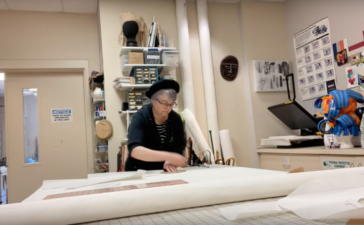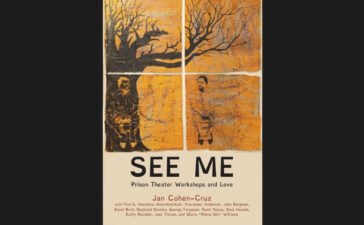Edward: Jermyn Street Theatre is a great place to do my show. I don’t actually know the budget for the Jermyn Street Theatre. I was paid as a writer, which was, as you hear, not that different. I do think the fact that living expenses are less helps. It also makes things possible for the actors, who can make a living at it. Sort of. But the experience was great.
Stylistically, getting people used to my style, which I realized was very New York, was a whole thing. On the other hand, it was a very supportive world, and the actors were great people. People were excited about theatre in London.
My other shows in London are quirky. The pub theatre scene is a little bit like our Off-Off-Broadway/indie theatre. It’s fun, bare bones. Nobody’s making any money. I got a nominal fee.
So, that was my experience in London. Obviously, I liked it enough that I’m going back. I’m excited to go back.
The Czech Republic is very different. I mean, the fees there are relatively thin by our standards, but the living expenses are relatively tiny by our standards.
The Czech Republic particularly has that tradition that comes from Václav Havel, and playwrights are still important in their world. It’s interpreted, but it’s still… It feels like you’re putting on the play with an interpretation.
To give you a sense of it, the last time I was there, I taught at their theatre institute What people were saying to me is that, nowadays, people are looking at script dominant productions as almost old-fashioned. The aesthetic is moving, I think, being moved by the European impulses. It’s interesting, because all the Czech work that I am familiar with is relatively standard in terms of the American mindset of, “There’s a script. There’s a production.” In my discussions to get my work done there recently, I’ve been trying to suss out what the aesthetics of these various theatres are.
It’s our responsibility, if we’re going to work in this tradition, to have an eye on one’s own work from a global perspective.
Cori: Is there anything that anyone would like to add that would be important for somebody who has never done something overseas?
Crystal: Yeah, I’ve been dismayed how little Americans know international work. Theatre is international. If you want to dig down deep into this as an artist, you should know the other players.
Sam: Totally. I would add, for an American audience reading this, that there tends to be a sheltered sense of how to make a life in the theatre. I see myself as a living example of the fact that you can sustain a life in the arts if you look outward, make connections with other arts economies in different countries, and foster those relationships.
It’s possible. It’s a tried-and-true tradition for fine artists, who are represented in multiple countries, work in multiple countries, create their work in multiple countries, have studios in multiple countries. It’s possible for us to do as writers as well
Also on an art historical level, an artist has to understand that America is actually one of the youngest theatre histories globally. It’s our responsibility, if we’re going to work in this tradition, to have an eye on one’s own work from a global perspective.
Andrea: I’m going to piggyback super quickly on that. European countries have a lot of arts funding for their artists to tour. So you don’t have to go to Europe to go to these things. There’s a lot of great touring work that comes through New York, because European countries tour
The Schaubühne puts everything on a big barge and sends their huge sets to Brooklyn. If you ask them at the Schaubühne, they’re like, “Oh, we’ve got a barge here going to China. We’ve got another set going here. We’ve got another set going here.” It’s really eye-opening to see and investigate the form and the aesthetic of the art form that we work in.
Edward: Speaking about the other way around, America does not fund international touring. I did this little class in Prague about experimental theatre in New York. Not even that experimental—I mean, Mr. Burns: A Post-Electric Play was among the pieces I talked about. And nobody had heard of anything, nothing. We don’t fund that sort of thing, so there’s this giant gap of knowledge going on.
For me, it creates a whole opportunity to expand knowledge and bring my work there. I realized, because I’ve had a couple of articles and things in the Czech paper, they had heard of me more than most playwrights in America—because I engage.
Cori: Well, thank you all so, so, so much for your time and sharing your experience. If we’re all part of this big world, we should know a little bit more about what’s happening in it, in our field.






Your article helped me a lot, is there any more related content? Thanks!